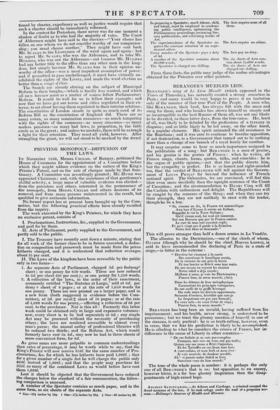BERANGER'S MUZZLED LION.
BERANGER'S song of Le Lion Magda (which appeared in the Times of Thursday), has naturally created a strong sensation in Paris ; and many would be very happy to prove it an imitation only of the manner of that true Poet of the People. A man who, like BERANGER, their bard, has always felt with the mass and sung for them, and who besides has shown himself as simple and as incorruptible as the best Roman of' them all, was not one likely to be diverted, in these latter days, from the true cause. He, least of all, was likely to be deluded by the professions of a tyranny in disguise; and as little likely to be led away, on the other hand, by a popular clamour. His spirit animated the old resistance to the Bourbons; and it was sine to continue to breathe opposition, if not destruction, to a Government that turned out to be nothing more than a change of one branch of a royal family for another.
It may surprise some to hear so much importance assigned to the publication of a song : but BERANGER is a man of genius, and his genius is the genius of France : when he writes, all France sings, chants, hums, quotes, talks, and coincides : he is the organ of public opinion,—not that the public directs him, but the sympathy is perfect. He is so honest and right-minded too, that the verdict of BERANGER will tell against the Govern- ment of Louis PHILIP far beyond the influence of French: national spirit. The Orleanites, we are convinced, will feel this blow even more decidedly than the upright sentence of the Court of Cassation; and the recommendation to HENRI Cinq will fill the Carlists with enthusiasm and delight. The Republicans will be caught by the romance of the thing; and when they can try their strength, they are not unlikely to start with the leader, though he be a boy. "Si, comme on (lit, Is France est monarchique. .Aux lacs d'Ecosse ii exists en Enfant,. Rappelez le sur la Terre Salique;
innocent. Sur vienne seul, lui seul est Sur son Remelt que par la France entiere
Le sort de tons soit attssitot regle, Et qu'a vingt ans il guide a la frontiere
Notre lion libre et demusele."
This will prove stronger than half a dozen armies in La Vendee.
The allusion to the Doctrinaires,—one of the chiefs of whom, Guam (though why he should be the chief, Heaven knows),.is said to have recommended the declaring of Paris in a state of siege,—is bitter in the extreme :
44 Derrikv lui viennent it la curie Des courtisans le famelique essain,
De la victoire ils out pris la livr6e
Et ton hurler se fletrit sous leur main.
De nos tyrant en voyant lee sicaires Notre soleil a deja recule;
Malheur it units, je vois les Doctrinaires; Pauvre lion, tu seras muscle, (bin).
Dans lee detours de leur metaphysique
Escamotant lee principes vainqueurs, Ps out scent: de ta griffe heroique Du code noire let &eras oppresseurs. Serment d'esclave, heredite qtte sais-je
Le despotisme est par eux
To veux cela—tu veux Petat de skge; Pauvre lion, tu seras musele."
BERANGER has long been an invalid, having suffered from his imprisonment; and his health, never strong, is understood to be precarious; but we trust the gloomy mention of himself, in one of the stanzas, is only poetical : he is so truth-telling, luniever, even in verse, that we fear his prediction is likely to be accomplished..
He is alluding to what he considers the crimes of France, her in difference to the cause of Liberty in other countries- " De ces forfaits je no sums pas complice Fra.ng-ais, men vers ne vous ont pas tralii;
Quinze ans ma muse a fletri !Injustice,
Et les Tartuffes en ces lieux tont hills.
A vous eufitns, et mon loth et man awe! Je vain inourrir, de douleur accahle, Ali! si jantais notre Soleil se leve,
Souvenez vous du lion muscle."
The tone of the whole poem is sombre: it is perhaps the only one of all BERANGER'S that is so; but opposition to an enemy, however bitter, is a far less gloomy inspiration than the disap- pointments of high-raised hope.


























 Previous page
Previous page